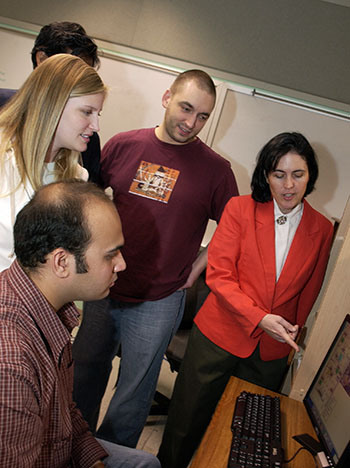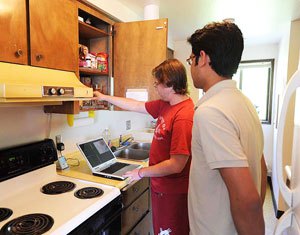 CASAS: Center for Advanced Studies in Adaptive Systems
CASAS: Center for Advanced Studies in Adaptive Systems
Since the miniaturization of microprocessors, computing power has been embedded in familiar objects such as home appliances and mobile devices; it is gradually pervading almost every level of society. In the last decade, machine learning and pervasive computing technologies have matured to the point where this power is not only integrated with our lives but it can provide context-aware, automated support in our everyday environments. One physical embodiment of such a system is a smart home. In the home environment, computer software that plays the role of an intelligent agent perceives the state of the physical environment and residents using sensors, reasons about this state using artificial intelligence techniques, and then takes actions to achieve specified goals.
During perception, sensors embedded in the home generate readings while residents perform their daily routines. The sensor readings are collected by a computer network and stored in a database that an intelligent agent uses to generate useful knowledge such as patterns, predictions, and trends. On the basis of this information, a smart home can select and automate actions that meet the goals of the smart home application.
The CASAS project treats environments as intelligent agents, where the status of the residents and their physical surroundings are perceived using sensors and the environment is acted upon using controllers in a way that improves the comfort, safety, and/or productivity of the residents. We design our AI methods to be as sensor agnostic as possible, which allows our approach to consider information from wearable as well as ambient sensors. Research groups utilize CASAS datasets for use in their own research, creating a collaborate approach and improving technology evolution.
 The CASAS Smart Home project is a multi-disciplinary research project at Washington State University (Pullman, WA) focused on the creation of an intelligent home environment.
The CASAS Smart Home project is a multi-disciplinary research project at Washington State University (Pullman, WA) focused on the creation of an intelligent home environment.
The Center for Advanced Studies in Adaptive Systems (CASAS) views the smart home as an intelligent agent that perceives its environment through the use of sensors, and can act upon the environment through the use of actuators. The home has certain overall goals, such as minimizing the cost of maintaining the home and maximizing the comfort of its inhabitants. In order to meet these goals, the house must be able to reason about and adapt to provided information.
Dr. Diane Cook has been testing the technology for the elderly to help them prepare food, make hands-free phone calls, and remember to take their medication. As well as making life easier, she believes it could revolutionize care for the elderly by allowing people with physical and mental disabilities to look after themselves at home for longer.
The ability to assess information and act by automating the control of devices and appliances goes well beyond what houses are capable of today. But Cook’s team has created “fairly robust models” for such a house, and she can envision a day when homeowners go to their local home improvement store to purchase sensor kits they install themselves. (A 2,000-square-foot apartment at the retirement home costs about $2,000 to rig with wireless sensors and software). Cook’s ultimate vision for is to detect changes in occupant behavior that indicate cognitive or physical deterioration. If the house could adjust to such impairments and provide warnings to family members, elderly with physical and mental disabilities can look after themselves at home for longer.
Cook’s work is funded by the National Institutes of Health, the National Science Foundation, the Department of Defense, the Department of Education, the Department of Energy, and Washington State’s Life Sciences Discovery Fund.
 CASAS: Center for Advanced Studies in Adaptive Systems
CASAS: Center for Advanced Studies in Adaptive Systems
